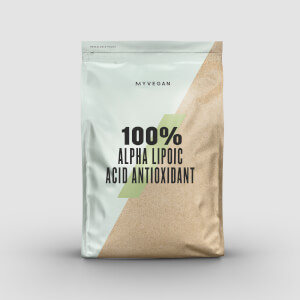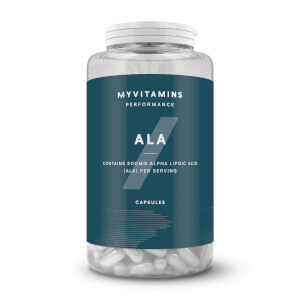All Customer Reviews
100% Alpha-Lipoic Acid Powder Customer Reviews
€16.49
4.33 Stars
24 reviews
5
4
3
2
1
5 out of 5 stars. 15 reviews4 out of 5 stars. 5 reviews3 out of 5 stars. 2 reviews2 out of 5 stars. 1 review1 out of 5 stars. 1 review
Where reviews refer to foods or cosmetic products, results may vary from person to person. Customer reviews are independent and do not represent the views of The Hut Group.
100% Alpha-Lipoic Acid Powder
5 out of 5 stars
"I put the powder in capsules and it makes a very cost effective supplement,"
by capsules
100% Alpha-Lipoic Acid Powder
5 out of 5 stars
"Studies of rat aging have suggested that the use of L-carnitine and lipoic acid results in improved memory performance and delayed structural mitochondrial decay. I like to take certain drugs and it helps clear me out, brilliant!"
by Great for detoc
100% Alpha-Lipoic Acid Powder
5 out of 5 stars
"This product is perhaps one of the most important anti-oxidants as evidenced by the previous reviewer. However, it is important to put the powder into capsules. ALA degrades very quickly in light and air, therefore, it's best to order it and pack it away into capsules and a bottle straight away. Do not mix it in any liquid, you will lose most of the content. Otherwise, it is a perfect crystalline yellow powder that when taken at 600mg a day, can provide improved glucose transport, and creatine utilisation, as well a host of anti-oxidant benefits for the immune system especially after a hard day of training."
by ALA review
100% Alpha-Lipoic Acid Powder
5 out of 5 stars
"Among its primary function in the body, where it is converted into lipoamide, is to activate enzymes that handle energy producing molecules, such as pyruvate, and to break down products from amino acids. Basically, ALA helps us collect energy and nutrients from the food we eat. The body needs ALA to produce energy. It plays a crucial role in the mitochondria, the energy-producing structures in cells. The body actually makes enough ALA for these basic metabolic functions. This compound acts as an antioxidant, however, only when there is an excess of it and it is in the ""free"" state in the cells[9]. But there is little free ALA circulating in your body, unless you consume supplements or get it injected. Foods contain only tiny amounts of it. What makes ALA special as an antioxidant is its versatility it helps deactivate an unusually wide array of cell-damaging free radicals in many bodily systems[10]. In particular, ALA helps protect the mitochondria and the genetic material, DNA. As we age, mitochondrial function is impaired, and it is theorized that this may be an important contributor to some of the adverse effects of aging. ALA also works closely with vitamin C and E and some other antioxidants, reusing them and thus making them much more effective. As mentioned earlier, ALA plays a large role as an anti-oxidant. It is such a powerful antioxidant that some researches have dubbed it the ""universal antioxidant."" Through studies, ALA has shown that it works in conjunction with vitamins C and E, to help improve their effectiveness in combating free radicals, as mentioned earlier [7]. Research has even shown that ALA can actually replace the function of vitamin C in animals deficient in vitamin C [4]. This is especially important to bodybuilders because intense physical activity such as weight training or extreme cardio can cause extreme oxidative damage, letting loose many free radicals in the body. That is why antioxidants, both natural and supplemental, are critical to bodybuilders. When ALA is on its own it can directly neutralize free radicals both in membranes and insides cells because it is both water and fat soluble [11]. This ability to neutralize free radicals is an extremely important benefit of lipoic acid. Yet it is in union with other antioxidants that ALA can really show its strength. ALA can mimic other antioxidants but also improve their performance because it replenishes them [12]. When one antioxidant molecule neutralizes a free radical, it actually turns it into a stable form. Then in a chemical reaction the free radical is eventually passed off to lipoic acid or glutathione molecule, which allows the original antioxidant to regenerate and neutralize more free radicals while ALA washes out the offending free radical [18]. Glutathione, ALA's wingman in this disposal process, is also a critical antioxidant. Alpha Lipoic Acid supplementation has been shown to boost glutathione levels, which drop significantly during periods of exercise induced stress by up to 50% [6]. When large amounts of free alpha-lipoic acid are available, such as with supplementation, alpha-lipoic acid is also able to function as an antioxidant [3]. Alpha-dihydrolipoic acid (DHLA) is the reduced form of alpha-lipoic acid, and is the only form that functions directly as an anti-oxidant. Free alpha lipoic acid is rapidly taken up by cells and reduced to DHLA intracellularly. Because DHLA is also rapidly eliminated from cells, the extent to which its antioxidant effects can be sustained remain unclear. Although only DHLA functions directly as an antioxidant, alpha lipoic acid may have indirect antioxidant effects [2]. ALA also increases intracellular glutathione levels. Glutathione is an important water-soluble antioxidant that is synthesized from the sulfur-containing amino acid cysteine. The availability of cysteine inside a cell determines its rate of glutathione synthesis."
by Excellent Product

